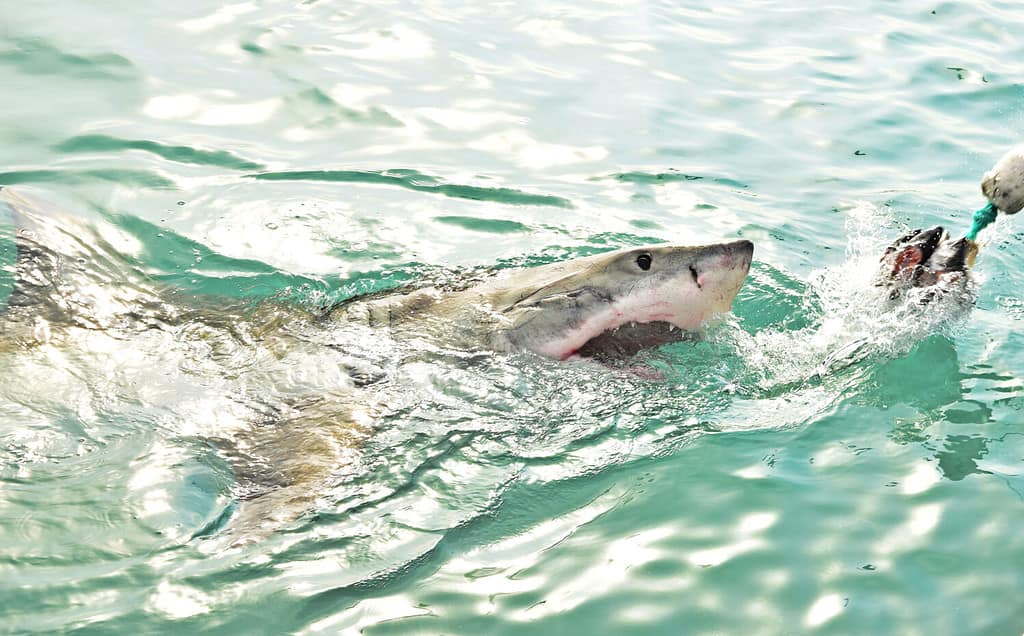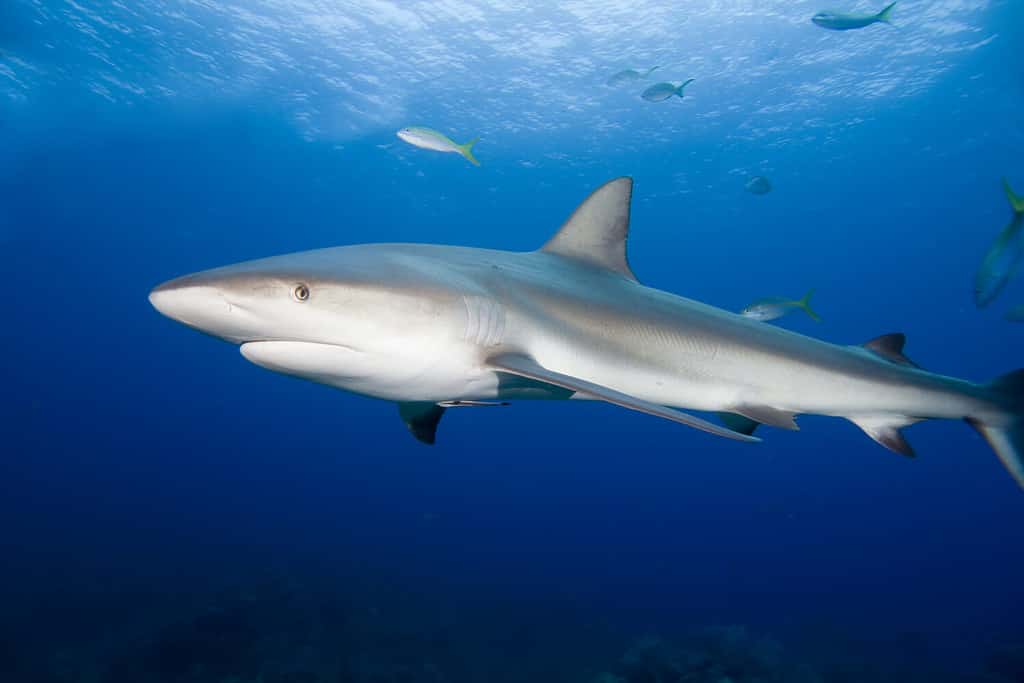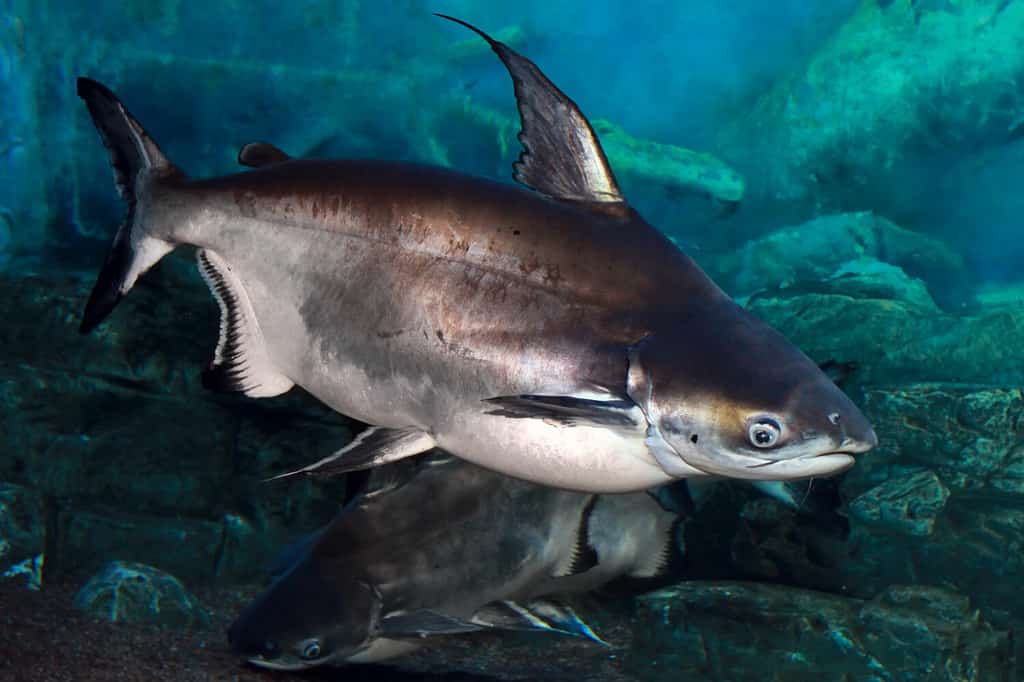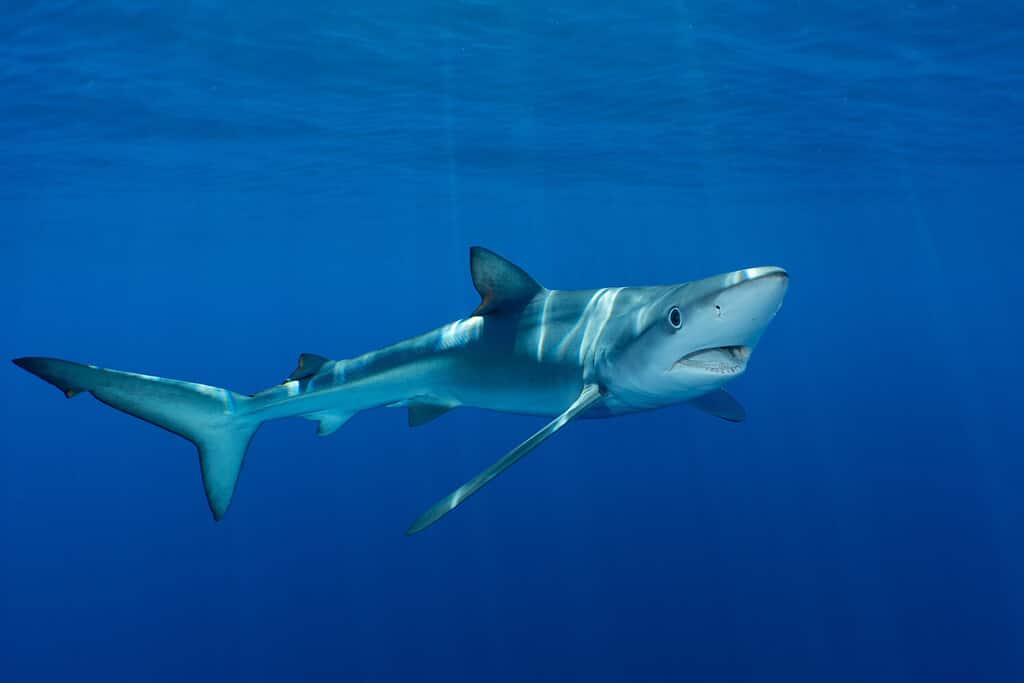Sharks are fascinating creatures that have existed for millions of years. They are famous for their sharp teeth, strong jaws, and impressive swimming skills. However, there have been persistent misconceptions and false impressions about sharks. One of the most common myths is that sharks will suffocate if they stop swimming. This article will explore the truth behind “Can sharks really drown if they stop swimming?” and answer some frequently asked questions about sharks.

When a shark stops swimming, it will lose the forward motion that is vital to keep after flowing over its gills.
©Light and Vision/Shutterstock.com
So, Can Sharks Really Drown When They Stop Swimming?
Contrary to popular belief, sharks do not have a swim bladder like most fish, which aids buoyancy. Instead, they rely on their large oily liver to stay buoyant in the water. When a shark stops swimming, it loses the forward motion necessary to keep water flowing over its gills, where oxygen is extracted from the water. The shark is not necessarily in danger of suffocating when it stops swimming. Its gills can still function and take in oxygen from the surrounding water. However, if extended for a while, sharks can sink to the bottom and inevitably die.
Can Sharks Swim Backwards?

The gills of a shark are positioned towards the back so they would disturb their breathing if they swam backward.
©Greens and Blues/Shutterstock.com
Sharks cannot swim backward because of the specific structure of their fins, which are designed to minimize sediment disturbance while swimming. Decelerating near the seafloor becomes challenging for them. Furthermore, sharks have their gills positioned towards the rear, so any attempt to swim backward would result in water rushing in, disturbing their breathing and potentially leading to their demise. Regrettably, certain anglers exploit this vulnerability by hauling sharks out of the water with their dorsal side facing the shore.
Adaptations for Survival
Sharks cannot swim backward. However, they have adaptations that aid their survival. Some shark species, like the nurse shark, can pump oxygenated water over their gills even when not actively swimming. This allows them to breathe while resting on the seafloor. Sharks also use their pectoral fins, tail, and body positioning to control buoyancy and navigate the water.
Sharks and Energy Conservation
Sharks are capable of swimming for extended periods without tiring. Certain species, like the great white shark, have been observed swimming continuously for up to 36 hours. However, sharks do require periodic rest to conserve energy. They may slow down or even stop swimming for short periods. When you think, “can sharks really drown if they stop swimming?” the answer is always it depends how long they stay stationary.
Causes and Implications of Swimming Belly Up
Sharks may swim upside down, showing their bellies, for various reasons like illness, injury, or stress. This behavior helps them save energy and swim slower when they are distressed. Also, swimming belly up aids in regulating their body temperature, especially in colder water. Some shark species, such as the zebra shark, display tonic immobility and temporary paralysis when flipped upside down. Researchers utilize this behavior as a non-lethal method to capture sharks. However, prolonged swimming in this position can indicate underlying health problems that could eventually lead to the shark’s demise.

While sharks are at the top of the food chain, human activities endanger them.
©Tatiana Belova/Shutterstock.com
Conservation Concerns of Protecting Sharks in the Wild
Sharks are at the top of the food chain, but human activities endanger them. Fishing too much, polluting the water, and destroying habitats have caused their numbers to drop. We need to act now to save them. Ways we can help ban shark finning, protect important habitats, reduce how many sharks get caught accidentally (bycatch), face climate change, teach people about sharks, and join international efforts. Taking these steps will help us look after sharks now and in the future.
Shark Research and Conservation
Continued research and conservation are essential for understanding sharks better and protecting them. Shark studies are always developing, using new methods, tech, and science to uncover the unknown. Keeping up with these developments can help us learn more about sharks and contribute to their protection. Being involved in these efforts is a good way to ensure sharks and their habitats stay safe.
Scientists use different methods to study sharks. This includes things like acoustic tagging, satellite tracking, and genetic testing. These methods give us useful information about their movements, population numbers, and places they live in. Scientists also use special cameras and drones under the water to watch how sharks act in their natural habitat. This helps them learn about what they eat, how they interact, and how they reproduce. All of this knowledge helps us better understand sharks.
Research on sharks is important for more than just understanding these animals. It can help us protect them too. Research data and analysis help us determine which shark species are vulnerable, create protected areas, and use sustainable fishing practices. By doing this, we can ensure their populations stay healthy in the long run. Research also tells us how to look after habitats, stop by-catching, and use responsible fishing methods. Putting research into action is the best way to keep sharks safe in the future.
By supporting ongoing research efforts and translating scientific knowledge into conservation strategies, we can contribute to protecting sharks and their habitats, ultimately preserving the delicate balance of marine ecosystems.
The Economic Value of Sharks Beyond the Waters
Sharks have more than just ecological importance; they also provide economic value. Sharks contribute to many industries and economies, both local and global. This highlights how important sharks are to people.
Ecotourism provides an opportunity for sharks to help the economy grow. People from all over come to go shark watching or diving, bringing money to cities near coasts and helping local companies. Some areas with many sharks have created plans to ensure the sharks and their homes are safe while people visit.
Sharks are essential for keeping up fisheries, providing income for fishermen, and helping out seafood businesses. People’s demand for products like shark fin soup has caused commercial fishing. To help sharks keep living and make sure the ocean stays healthy, it is essential to fish sustainably and manage them properly.
Understanding the economic factors related to sharks is important for creating sustainable approaches that balance environmental protection and economic advantages. By recognizing how much value sharks have in both their ecological role and financial contributions, we can support a complete approach to shark conservation and secure its sustainability over the long run.

Sharks have always been fascinating creatures with a rich heritage.
©Samy Kassem/Shutterstock.com
Cultural Significance and Mythology of Sharks in Human History
Sharks are of great significance in coastal communities. They are seen as strong, wise, and adaptable animals; some cultures even believe they have spiritual or supernatural powers. Sharks often feature in creation stories, where they act as protectors.
Sharks have always fascinated people. They’ve been represented in sculptures, paintings, and tattoos for centuries – from ancient cave paintings to modern pieces. This shows how much respect and admiration these animals command in human culture. The impact of sharks is strong and long-lasting.
Exploring sharks’ cultural significance and mythology can help us better understand our relationship with them and their impact on our beliefs and traditions. Appreciating the rich heritage associated with these animals can lead to increased respect for them and more successful conservation efforts. Protecting sharks now will ensure that future generations can enjoy them as we do today.
Conclusion
The question, “Can sharks really drown if they stop swimming?” is common. Sharks possess modifications that allow them to compensate for sinking and survive in their environment. Understanding the truth about sharks and dispelling myths is essential for appreciating and conserving these remarkable creatures and maintaining the health of our oceans.
The photo featured at the top of this post is © Elias Levy / CC BY 2.0 – License / Original
Thank you for reading! Have some feedback for us? Contact the AZ Animals editorial team.






